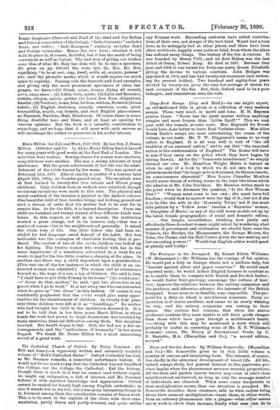Marie Hilton: her Life and Work, 1821- 1896. By her
Son, J. Deane Hilton (Isbister and Co. '7s. 6d.)—Marie Hilton busied herself for many years with good works at the East End of London. Her activities were various. Sewing-classes for women were one form, soup-kitchens were another. She was a strong advocate of total abstinence But the great achievement of her life was the estab- lishment of the crache known by.her name. This was opened on February 21st, 1871. Almost exactly a quarter of a century later (April 10th, 1896), its founder passed away. The members were at first limited to twenty-five (ten infants and fifteen young children). Only children born in wedlock were admitted, though occasional exceptions were made to this rule. The physical and moral condition of the inmates is painted in the darkest colours. One beautiful child of four, besides biting and kicking, poured out such a stream of oaths that his mother had to be sent for to remove him. As for the filth, it is beyond description. From one child one hundred and twenty vermin of four different kinds were taken. In this respect, as well as in morals, the institution worked a great change, not in its inmates only—that was a matter of course —but in the neighbourhood generally. It raised the whole tone of life. One little fellow who had been ex- cluded for bad language cured himself of the habit. Not less noticeable was the contagion of charitable feeling that it pro- duced. The mother of two of the crèche children was locked up for fighting. The twelve women who worked with her in the same department of a warehouse subscribed 2s. a week for six weeks to pay for the two little creatures sleeping at the place. In another case there was a child dependent upon a grandmother. (This was one of the few instances in which the child of an un- married woman was admitted.) The woman had no subsistence beyond 4s., the wage of a son, a boy of thirteen. She said to him, 4' I shall have to put little Tommy in the house " [the workhouse]. —" Never do that, mother," he said, " put two slices less in my parcel when I go to work." It is not every one who can remember when he gave up " two slices " in this fashion. Of course it was confidently prophesied that the creche would give many oppor tunities for the abandonment of children. In twenty.four years only three children were left at it as " foundlings." No mother who had brought her child to the institution deserted it. It is sad to be told that in her later years Marie Hilton, in whose bands the work had grown to large dimensions, was troubled by many anxieties, financial difficulties among them. Her daughter married. Her health began to fail. Still, she had not a few en- couragements, and the "enthusiasm of humanity" in her never flagged. We thank Mr. Deane Hilton for a most interesting record of a great work.






































 Previous page
Previous page